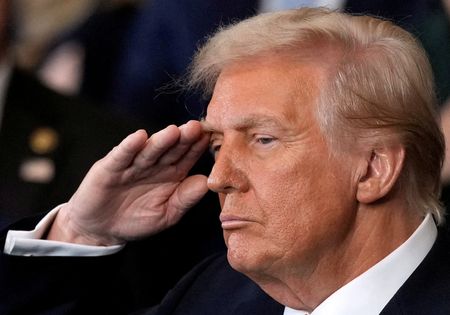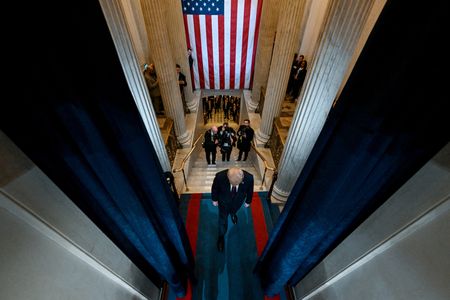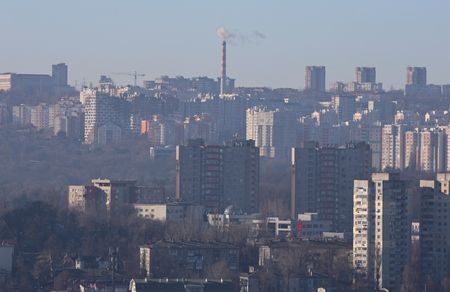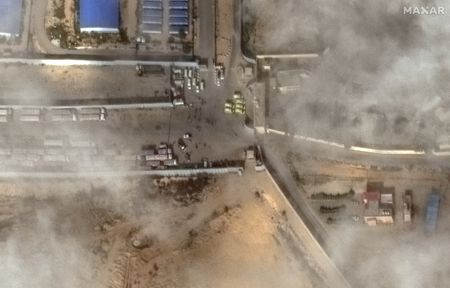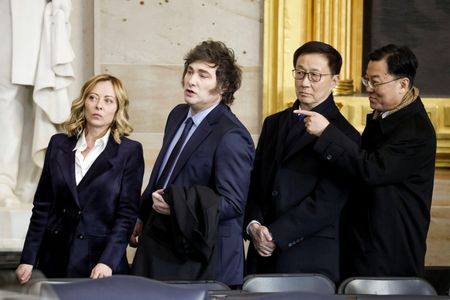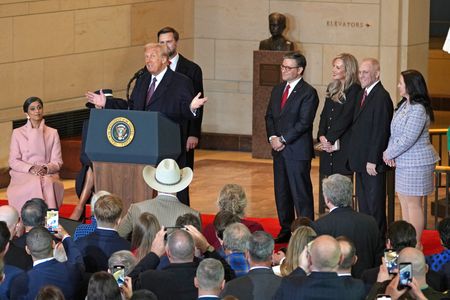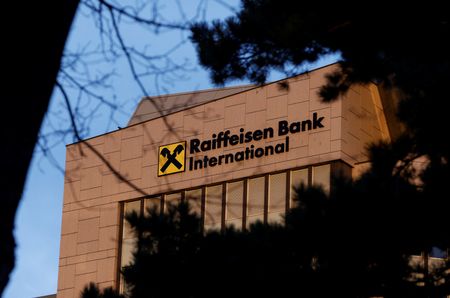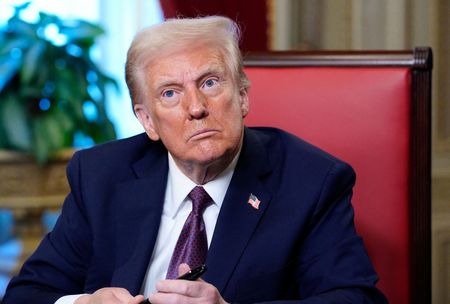By David Lawder, Andrea Shalal and Steve Holland
WASHINGTON (Reuters) -President Donald Trump did not immediately impose tariffs on Monday but said in his inaugural address the U.S. would collect “massive amounts” of income from foreign trade duties as his administration works to rebuild American industry.
A Trump administration official said the new president would issue a broad trade memo that stops short of immediate tariffs but directs federal agencies to evaluate U.S. trade relationships with China, Canada and Mexico.
After weeks of global speculation over which duties Trump would impose on his first day in office, news that Trump would take more time on tariffs drove a relief rally in global stocks, while other major currencies rallied against the dollar.
Trump mentioned no specific tariff plans in his inaugural address, but repeated his intention to create the External Revenue Service, a new agency to collect “massive amounts” of tariffs, duties and other revenues from foreign sources.
“I will immediately begin the overhaul of our trade system to protect American workers and families,” Trump said. “Instead of taxing our citizens to enrich other countries, we will tariff and tax foreign countries to enrich our citizens.”
Trump added that his policies would make America “a manufacturing nation once again.”
Howard Lutnick, Trump’s nominee for Commerce Secretary who has been designated as his overall trade policy chief, told a rally that the External Revenue Service “will put up tariffs for walls of protection” for U.S. industry that will push foreign companies to build factories in America.
During his election campaign, Trump vowed to impose steep tariffs of 10% to 20% on global imports into the U.S. and 60% on goods from China to help reduce a trade deficit that now tops $1 trillion annually.
He said after his November election that he would sign “all necessary documents” upon taking office to impose an immediate 25% import surcharge on imports from Canada and Mexico if they failed to clamp down on the flow of illicit drugs and migrants entering the U.S. illegally.
Such duties would tear up longstanding trade agreements, upend supply chains and raise costs, according to trade experts.
The official, confirming a Wall Street Journal report that cited a summary of Trump’s memo, said the new president will instead direct agencies to investigate and remedy persistent trade deficits and address unfair trade and currency policies by other nations.
The memo will single out China, Canada and Mexico for scrutiny but will not announce new tariffs, the official said. It will direct agencies to assess Beijing’s compliance with its 2020 trade deal with the U.S., as well as the status of the U.S.-Mexico-Canada Agreement, the official said.
RELIEF RALLY
The U.S. dollar slumped broadly on the news against a basket of major trading partners’ currencies, with particularly large upswings in the euro, Canadian dollar, Mexican peso and Chinese yuan. MSCI’s measure of global stock markets rose. U.S. financial markets are closed for the Martin Luther King Jr. Day holiday.
Some industry groups and trade lawyers in Washington had speculated that Trump would invoke the International Emergency Economic Powers Act, a law with sweeping powers to control imports in times of national emergency, to impose immediate tariffs.
But the forthcoming trade memo signals a more methodical approach that would likely involve trade investigations under other legal authorities such as the Section 232 national security trade law and the Section 301 unfair trade practices statute. Trump invoked these laws during his first term, and probes on steel and aluminum and Chinese imports took months to complete.
Canadian Finance Minister Dominic LeBlanc told reporters in Ottawa that it would be a positive step for the U.S. to study bilateral trade ties rather than impose tariffs. Industry groups also expressed relief at the reported lack of immediate duties.
“U.S. businesses would welcome a deliberative approach that identifies unfair trade practices and helps Americans succeed in the global economy,” said Jake Colvin, president of the National Foreign Trade Council, which represents a broad swath of large American companies on trade matters.
Trade analysts said they still expect Trump to press ahead with a global tariff early in his administration.
“The universal tariff was a core part of the economic plan he ran on and I think he’s going to do what he said he would,” said Kelly Ann Shaw, a former White House trade adviser during Trump’s first term.
“This is an idea he’s supported for a long time,” Shaw, now with the Hogan Lovells law firm, said in an interview last week.
PAST TRADE PLAYBOOK
In his 2017-2021 first term, Trump’s administration used investigations to impose tariffs on steel and aluminum imports and launch duties on some $370 billion worth of Chinese imports, igniting a tit-for-tat tariff war between the world’s two largest economies.
The U.S. and China ended the conflict in 2020 with a deal for Beijing to boost its purchases of U.S. exports from farm goods to aircraft by $200 billion annually but never followed through as the pandemic hit. The forthcoming memo indicates that Trump’s administration will try to push China to keep those commitments.
(Reporting by Steve Holland, Rami Ayyub, Doina Chiacu, David Lawder and Andrea Shalal; Editing by Toby Chopra, Daniel Wallis, Andrea Ricci, Rod Nickel and David Gregorio)

